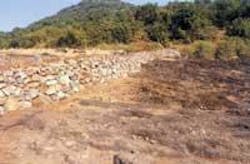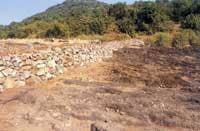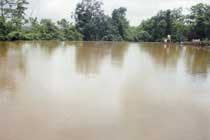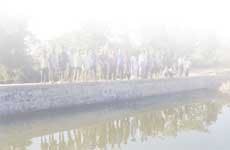Participatory approach ensures project sustainability
By Dr. Ajit Gokhale
A collaborative project carried out by the non-governmental organization SHARE, the village community of Vihule Kond and Ion Exchange (India) Ltd. resulted in the construction of two rainwater ponds with 2,000 m3 of water storage capacity.
Villagers living in the narrow coastal Konkan region of Maharashtra, India, face severe water scarcity in summer months. Torrential rain falls during the monsoons, but the 22 short and rapid rivers originating in the Western Ghats quickly transport the overflow into the Arabian Sea. Several hundred villages face water scarcity every year due to this phenomenon.
Vihule Kond is a typical hill village in this region. Maximum soil depth is two to eight feet with an average depth of five feet. The soil is lateritic and highly permeable. Moreover, the layer below the soil is hard, almost continuous, sparsely fragmented basalt. This rocky layer slopes towards north and west, making groundwater run through the soil and reach the impervious layer quickly after it runs down the slope and is lost to the village.
More than 2,500 to 3,000 mm of rain falls annually. The monsoon stream near the village is shallow with a relatively small catchment area, and flows only until December. Villagers use a nearby well for drinking water and rainwater streams for washing clothes and bathing during the monsoons. Wells are used when streams start drying up in November. Usually one borehole is brought into use from which water is pumped into the nearest dry well from where they obtain water. By mid-March, this source diminishes, forcing villagers to walk about four kilometres to another village for water. After March, most of the villagers' energy and time is spent in travelling long distances to obtain water for the family and livestock.
The government funded the construction of nullah bunds, gully plugs, a masonry bund and three borewells, amounting to US$ 8,395. Through their own efforts, villagers provided five borewells and the excavation of a small shallow pond amounting to US$ 4,200, besides three dug wells and three waterholes constructed by the previous generation. Water holes are tiny depressions dug in the soil that have small springs, which produce water.
Clearly, no quick-fix solution could solve this recurring water scarcity, so Ion Exchange and SHARE proposed the following solutions:
• creation of ponds at indicated sites, including an excavated pond upstream of the government bund;
• constructing a stream bund near Fanasoni – a place with a monsoon stream flowing on basaltic depression;
• lining of ponds with stone masonry;
• waterproofing the tanks, if necessary;
• lining the water holes on the dry side;
• introducing bund plantations, farm ponds, roof top rain water use;
• making trenches in upper forests;
• recharging borewells.
The NGO and Ion Exchange advocated a participatory approach for the rainwater harvesting project, which involved a variety of skills, disciplines and competencies. The villagers accepted the proposed solutions with minor changes and began excavating two ponds.
So far, villagers dug two rainwater harvesting ponds, built two bunds across a stream and constructed regular watershed structures, such as trenches and gully plugs. SHARE funded US$ 4,830 for the project and Ion Exchange provided technical consultancy. Villagers contributed more than 5,000 man-days of work, free of cost, which if valued, would be equivalent to US$ 6,300. In addition, village students worked an equivalent 40 days, making minor gully plugs and small gabion structures. During the next two years, additional work, such as pond lining, seepage control and development of tree plantations will consolidate the work completed so far.
A Rotary Club in Bombay and a few philanthropists are financially supporting this phase with US$ 4,200. In addition, villagers are contributing 500 man-days of labour.
Involvement in the project has increased villagers' awareness of water-related problems, their causes and ways to mitigate these problems on a long-term sustainable basis. Consequently, villagers have resumed second-cropping of pulses, legume seed crops that act as a protein source in the predominantly vegetarian diet, and are debating on the possibility of stall-feeding cattle and raising milk-producing animals, such as cows and goats.
Author's noteDr. Ajit Gokhale is the technical manager of Ion Exchange Enviro Farms Ltd, an agribusiness venture for eco-friendly farming, a subsidiary of Ion Exchange (India) Ltd. Dr. Gokhale has 12 years of research and development and education in ecology and sustainable development. He has first hand experience in watershed development-based project implementation.



